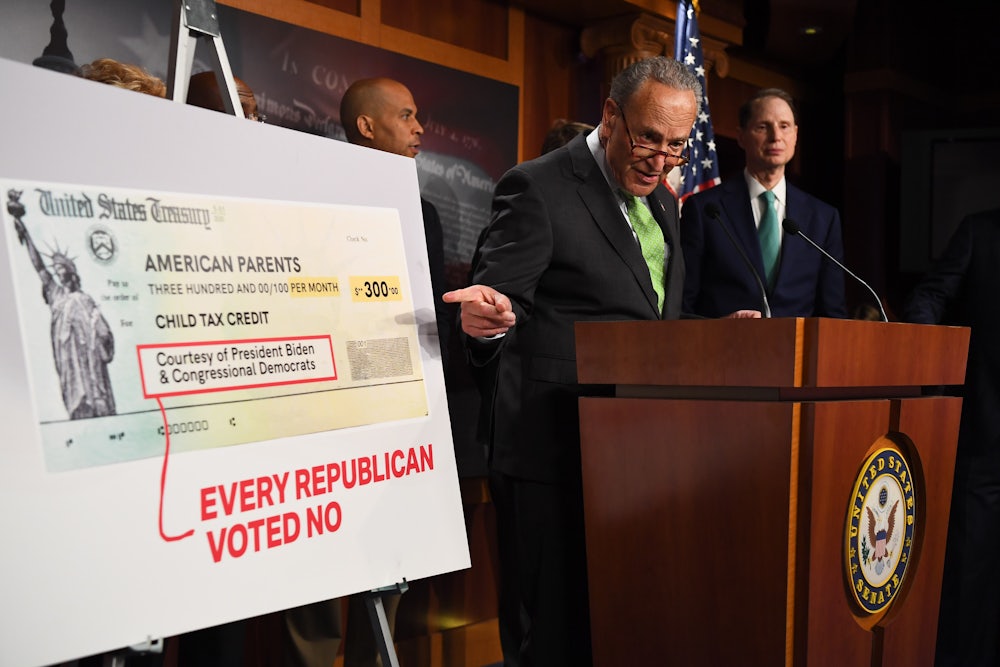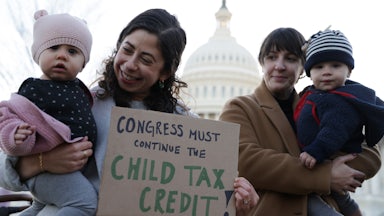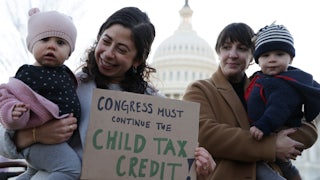American women are facing a series of cascading crises: rising inflation, soaring food prices and spiking gas costs; the nationwide shortage in baby formula that could take weeks to rectify; the mental health crisis among the nation’s children, still struggling to catch up academically; a looming Supreme Court decision that will likely overturn the right to an abortion.
Women, who are disproportionately caregivers in their families, are traditionally a powerful voting bloc: In the 2020 election, nearly 10 million more women voted than men. But in the critical midterm contests that will determine which party controls the House and Senate, women may be more important than ever, as kitchen-table economic issues and reproductive health concerns promise to dominate the campaigns to come.
As the party in power, Democrats face a structural disadvantage going into the midterms and are widely expected to lose one or both chambers of Congress. The truism that elections are determined by turnout is a cliché for a reason: If women voters turn out for Democrats, it can turn the tide in the party’s favor. “Women voters are going to be the deciding margin,” said Celinda Lake, a longtime Democratic pollster. “Turnout of the base is a real issue for Democrats right now. Right now, the Republicans are pretty energized. The Trump voters are supercharged, but the Democrats are lagging behind.”
Polling suggests dire news for Democrats. A recent poll by the Women & Politics Institute at American University and the Barbara Lee Family Foundation found that women are increasingly disengaged with politics and disillusioned with political leaders. Forty-one percent of women surveyed said that they were tuned out from politics, an increase of 12 percentage points from last year, with a higher percentage for women of color and women under age 40. Fifty-three percent of women said that elected officials have let people down and not produced the results people want.
If disappointment with President Joe Biden translates to apathy among women voters, that will likely compound Democrats’ woes. A May poll by the University of Massachusetts at Amherst found that Biden’s approval rating was 37 percent among women surveyed, compared to 53 percent in April 2021. A poll by Quinnipiac University released last week had Biden’s approval rating at 39 percent among women. The Quinnipiac poll also found that only 34 percent of women approved of the job Democrats were doing in Congress; only 46 percent of women said they wanted to see Democrats keep control of the House in the midterm elections; and 48 percent want to see Democrats maintain control of the Senate. (Among white women, a majority wanted to see Republicans take control of the House and Senate.)
While there is a gender gap in party support, with women overall tending to support Democrats in presidential elections, there are significant differences between women among lines of race, level of education, marital status, and class. “Women are not monolithic. They’re not monolithic as candidates, and they’re not monolithic as voters,” said Debbie Walsh, the senior director of the Center for American Women and Politics at Rutgers University. For example, while Black women are a core demographic for Democrats, often propelling them to victory in difficult races, white women generally lean more to the right. But the majority of white women with college degrees supported Biden in the presidential election, while the majority of white women without college degrees voted for Trump.
Women voters, like their male counterparts, often consider the economy to be a priority when casting their ballot, putting particular importance on kitchen-table issues. “[Women] see themselves as more economically vulnerable, which makes sense: They make less money than men, they have less money saved for retirement, they tend to be more employment insecure,” Walsh said. (New data from the Census Bureau shows that women are more likely than men to rely on benefits like Medicaid and nutrition programs.)
There’s some bad news for Democrats in how women view the economy. A CBS News poll released on Sunday found that 35 percent of women approve of how Biden is handling the economy and 30 percent approve of how he is handling inflation. Women surveyed were evenly split over which party they trusted more to handle the economy, and a bare majority—52 percent—said they trusted Democrats more than Republicans on inflation.
Despite their economic troubles, Walsh said, women may still support Democrats—but whether they will be motivated to go to the polls is another question. “Historically, what we’ve seen is, at the end of the day, women are more likely to support Democratic candidates even in the face of something like this. The question is, will they turn out and vote?” she said. “I think the combination of a concern about the economy [and] a concern about the abortion issue could benefit Democratic candidates.”
The impending Supreme Court decision on abortion is an unknown variable in whether women will be motivated to turn out in November. A draft decision leaked to Politico indicates that the conservative majority will overturn the federal right to an abortion, although the court has not yet issued its official ruling. Although polling released before the draft decision was leaked showed that abortion has not been at the top of mind for voters, even women, that could change if the court overturns Roe v. Wade.
“The one issue we’ve seen that has the potential to really motivate voters is abortion, and the Supreme Court decision on Roe v. Wade,” Lake said. She added that the decision would motivate older women in particular, who could remember the time before legalized abortion and might put pressure on their husbands due to the importance of the issue.
Maggie Jo Buchanan, the senior director for the Women’s Initiative at the Center for American Progress Action Fund, a progressive organization, connected the issue of abortion to economic concerns for women. She said that legalized abortion resulted in increased labor force participation among women, an argument recently made by Treasury Secretary Janet Yellen. “Overturning Roe is a direct attack on women’s advancement in America, and many women know that in their gut,” Buchanan said.
A famous study by the University of California, San Francisco, followed a group of women who had wanted and obtained abortions and a group that wanted and was unable to get abortions, for five years. The study found that those women unable to obtain abortions had worse economic outcomes. A recent follow-up study for the National Bureau of Economic Research found that “being denied an abortion has large and persistent negative effects on a woman’s financial well-being.”
But there’s a chance that overturning Roe will motivate voters who oppose abortion rights as well. A recent poll by Politico/Morning Consult taken in the wake of leaked draft decision found that 40 percent of women believed it was very or somewhat important to support candidates who oppose abortion access. And it’s possible that the lack of congressional action to protect abortion rights could dampen enthusiasm among Democratic voters.
Congressional inaction on several topics could be disappointing to Democrats. After Congress allowed the expanded child tax credit to lapse at the end of last year, parental support for the Democratic Party dropped significantly. In December 2021, 49 percent of recipients of child tax credit payments said they were more likely to vote for Democratic candidates, according to a Morning Consult poll; by April 2022, 46 percent said they were more likely to support Republican candidates. (All Republicans opposed the legislative package that would have extended the expanded child tax credit.)
While it may be difficult for voters to distinguish between the two parties on economic issues, Lake said, the distinction on abortion rights is clear. “The problem is that inflation is an issue where voters think no one is doing anything; what are the differences between the candidates? The thing about abortion is … there is a clear distinction between candidates,” Lake said.
Senator Tammy Duckworth, a Democrat from Illinois who is up for reelection this year, told The New Republic that she believed the Roe decision would be a motivating factor for women voters in her state.
“I’m seeing women who didn’t come out for the marches but are becoming more engaged. Which, we had sort of lost them for a while,” Duckworth said. She added that gun violence would be at the top of mind for mothers, in particular, after the shooting in an elementary school in Texas that killed 19 children. “I think Roe and I think gun control are going to be something that really motivates women.”










